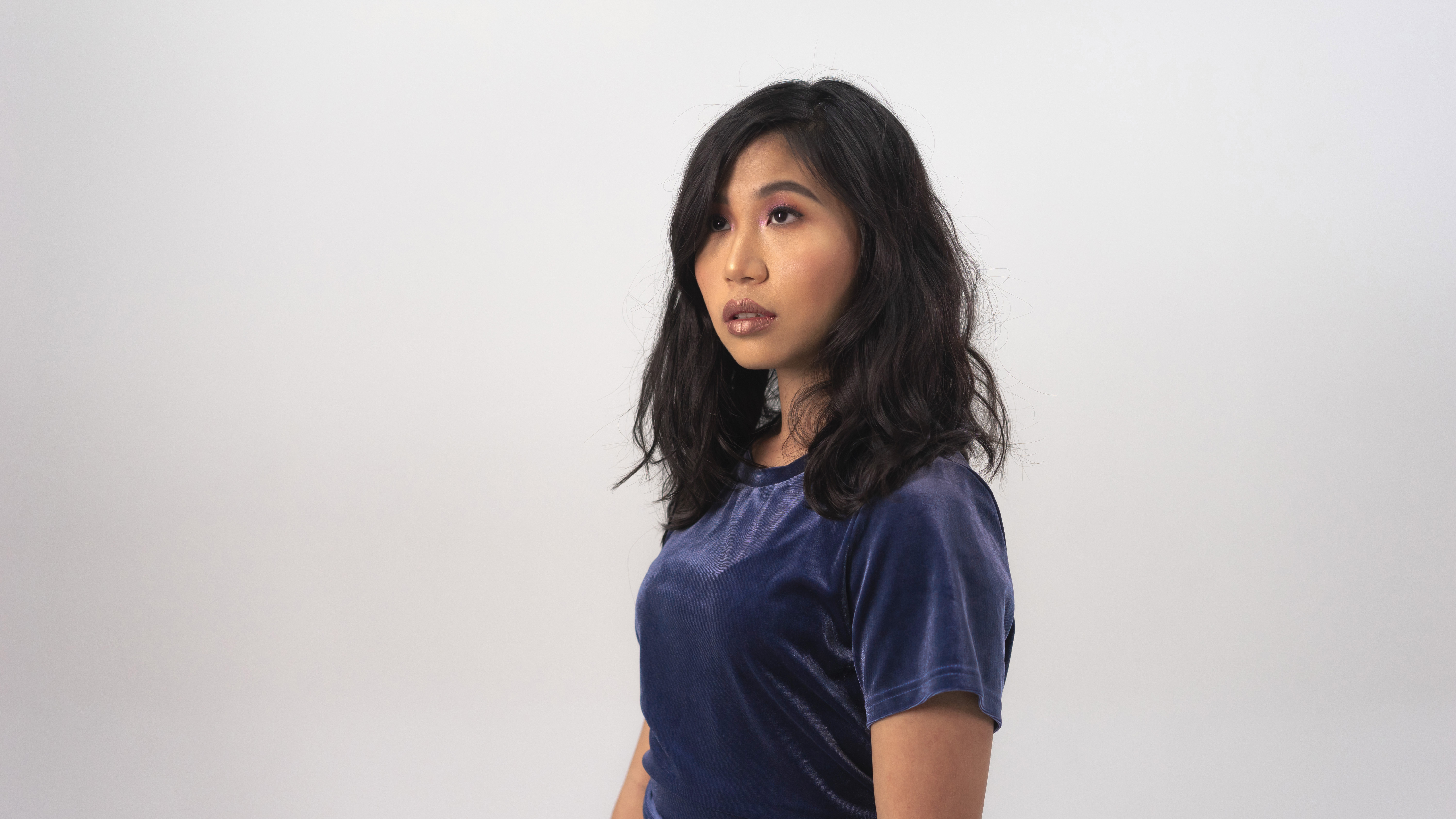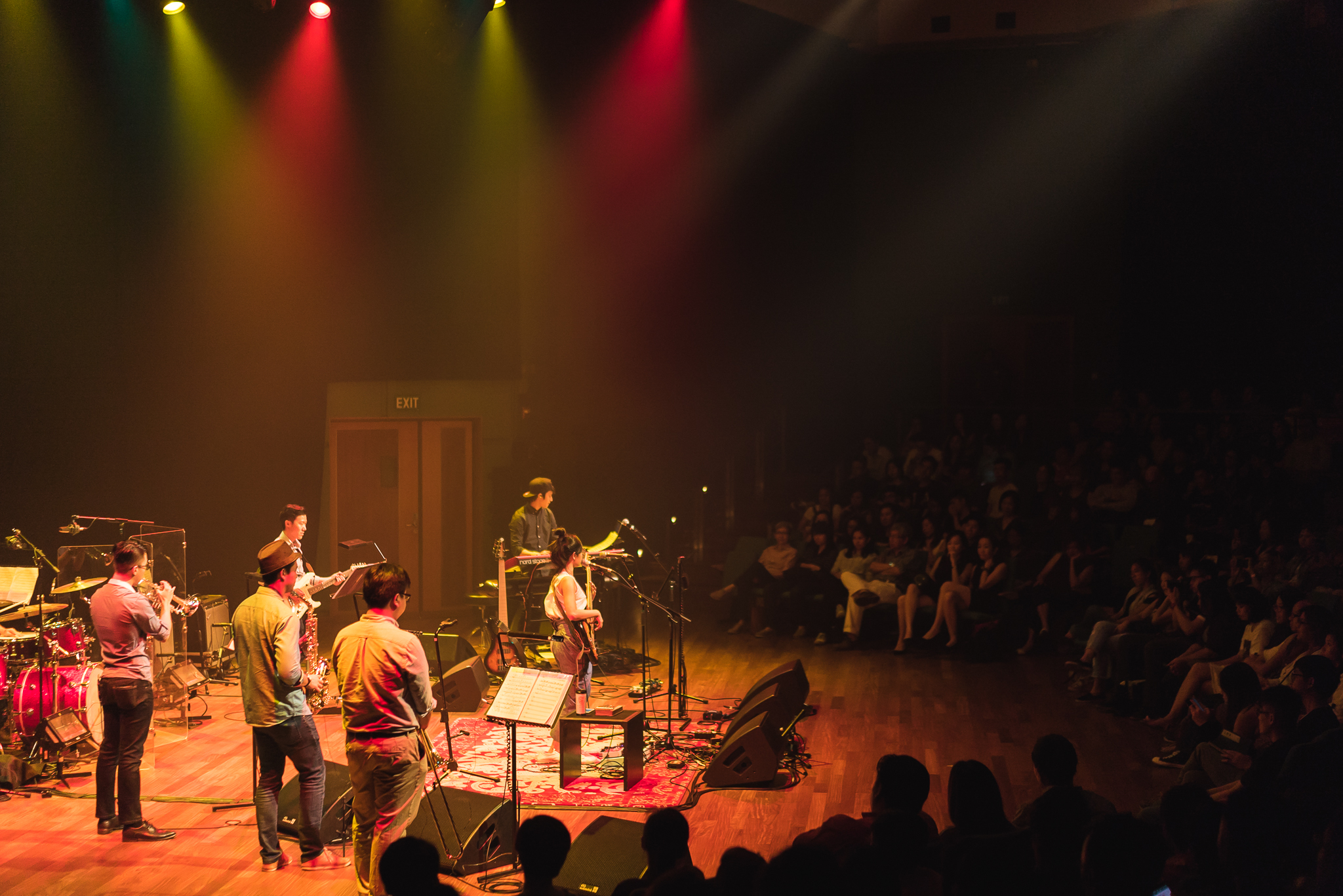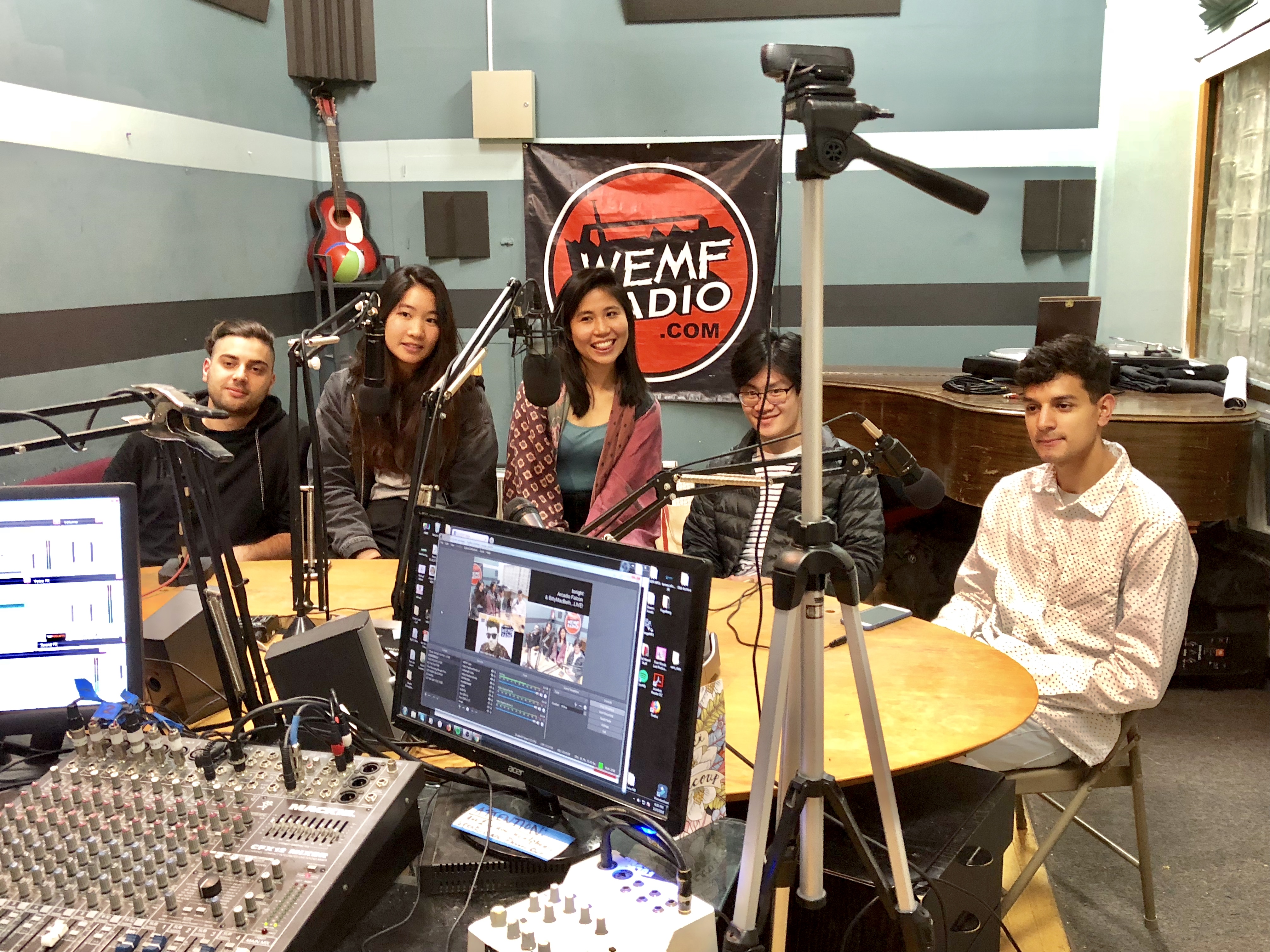bittymacbeth
Meet songwriter-producer from Singapore, Beth aka bittymacbeth.
Tell us a little bit about yourself.
Hi, I’m bittymacbeth, but you can call me Beth. I’m a songwriter-producer. When I perform, I sing, play bass and bass synth, but for writing purposes, I also somewhat play keyboard and guitar. I love anything that allows me to create, whether it’s toplining for a producer, or scoring a video game, or scrapbooking, taking photos even cooking pan-fried turmeric salmon or a coconut lime pork chop.
Describe the city you’re living in and what it’s like to live there.
I’m from Singapore and have been living in Boston for the past 2.5 years as I’ve been studying at Berklee. I’ll be going back and forth between describing both of these places.
Singapore is an efficient city-state-island-country-nation where waiting more than 5 minutes for the train (or MRT, which stands for Mass Rapid Transit), is considered a long time. It’s an everyday sauna and we live to eat. There are things to do if you know where to find it, but the easiest thing to do is just hang out in a shopping centre, of which there are way too many (like, c’mon everybody’s shopping online). It’s a young nation that has progressed so fast economically but to some expense of our arts and cultural heritage. I am heartened to see more government and community initiatives to put Singapore music on the world map now though.
Boston, on the other hand, prides itself on its history and heritage as one of the oldest cities in the US, where the first pilgrims landed and built their colonies and protested the British by throwing tea in the ocean #spillthetea. Also, compared to Singapore, the workforce here has great work-life balance, much to my inconvenience. By 5 pm sharp, I can’t access certain services anymore because those workers have gone home. Maintenance doesn’t work on weekends even if you have an emergency (like a rat infestation or a broken toilet). I once had to wait a literal whole week for my apartment to have new windows refitted, and the maintenance workers never take their shoes off in your house even if you ask them to. Boston has many events for different interest groups — comedy, LGBTQ, video games — but I wouldn’t consider it a music city, like Los Angeles, Nashville or New York.
What is the best and worst thing about living in your city?
Best: Plethora and ease of finding cheap and good food in Singapore. And there’s food everywhere, including supper places and interesting fusion options. For Boston, I would say is the low cost of groceries and housing needs in supermarkets like Trader Joe’s and Target- I also really love Boston’s Haymarket farmer’s market. I can get two punnets of blueberries for $3 and five lemons for $1.
Worst: HOUSING PRICES – both in Singapore and Boston. Living costs in general (despite the cheap coffee shop food in Singapore and cheap groceries in Boston) in both these cities are quite high when you factor in many other things.
Give us 3 words that describe what it’s like to be a creative in your city.
Singapore: Exciting, tough, improving
Boston: Competitive, saturated, rich
After graduating, I realised all of my band members were going to enlist in the army for mandatory national service. I wouldn’t have a band to play with anymore. So, I started to arrange and adapt my songs to live-looping with just my bass and voice.
How did you start your career in art?
I would say I started to do music semi-professionally while I was studying for a Diploma in Music and Audio Technology (DMAT) at Singapore Polytechnic. At the end of my first year there, I did my first paid gig, a community New Year’s Eve Countdown Party. I sang some Jason Mraz songs with a DMAT band called Que La Peace (shout-out to my Kueh Lapis-eating Singaporeans and Malaysians). My lecturer had asked me to join this sort ambassadorial band for our course even though I never auditioned.
I also started playing corporate jazz gigs with a small band that I was sorted into by my seniors in Singapore Polytechnic Jazz Band. Eventually, my bandmates decided they wanted to shift towards neo-soul so we played at some staple venues in Singapore like Timbre, the Esplanade, and Blujaz.
Around this time I was also writing a lot of original material as well as recording and writing lyrics and melodies (toplining) for classmates’ songs. After graduating, I realised all of my band members were going to enlist in the army for mandatory national service. I wouldn’t have a band to play with anymore. So, I started to arrange and adapt my songs to live-looping with just my bass and voice.
My first performance as bittymacbeth was at an open mic at an Irish pub to about 8 people in the audience, 3 of whom were my friends. Then I applied and played at the finals of a songwriting competition and came in second, then did a corporate gig to get the financial ball rolling (that cut my pay remarking “Why should [bittymacbeth] get 300, when for a little more, we can get The Sam Willows” — at this point, according to my sources, TSW was in four-figure range, so this was an absurd argument. However, this was one of my first few bittymacbeth gigs ever where I could play my own music, so I didn’t protest the pay cut.) I did several more singer-songwriter showcases before I started playing some larger arts events and festivals. I am super grateful to have played this one double-bill at an art gallery farewell party with Tim De Cotta – he really championed for me, booking me for gigs and his own wonderful Getai Soul festival and recommending me to other people, which really helped me get off the ground.
Were the people around you supportive of your decision on working as a creative?
I’m so grateful to have the support of my family, boyfriend and close friends. My mom was at first wary since, as many parents do, she valued stability. She had supported our family of four as a freelance writer and editor and put herself through university at the same time, so she figured that I might also be freelancing most of the time and didn’t want me to suffer any more than she did. However, I told her that if I went to Junior College and didn’t pursue my studies in Music and Audio Technology, I would feel, personally, that I would be surviving instead of living. I then worked hard and proved that I didn’t suck that much at musical composition and arrangement and engineering. I think the first moment of revelation was when she attended my concert at the Esplanade Recital Studio where I was performing with Singapore Polytechnic’s Jazz Band. My family and relatives have always been musically inclined but nobody really ever pursued it as a profession, except maybe for my father who taught guitar to many students, I think 20 at a time at one point, for a few years. That was kind of an a-ha moment for all of my family and relatives, who all came, save my grandparents who don’t do well in air-conditioned places for too long. It was a first glimpse at what I could be like as a professional musician, holding my own on the same stage so many international stars have performed on before. Ever since then they’ve tried to attend every show and listen to all of my songs. My boyfriend is also my unofficial second band member who drives me to my shows, helps me set up and tear down my bass and vocal rig, and also designed most of my cover artworks.
What are some goals and ambitions you have for your future work?
In 5 years, I aim to be a full-time composer-producer working on many different kinds of projects, from games to singer-songwriter songs. In 10 years’ time, I hope to eventually move to do the same songwriting and producing but as a full-time artist, while also producing for others similar to Pharrell, Missy Elliot, the list goes on. In say 15 years’ time, I want to have toured several countries like Japan, Hong Kong, Taiwan, USA, UK.
In 5 years, I aim to be a full-time composer-producer working on many different kinds of projects, from games to singer-songwriter songs.
If you could collaborate with any person in the world who would it be?
I’ve been in love with Anderson Paak and Yuna‘s new music of late if I could write a song with either of them that would be amazing.
How would you describe the women around you?
Strong, sacrificial, smart. My grandmother has always set an example for us by putting others ahead of herself and making sure everybody is well taken care of. Her three children are all daughters — my mom and her two younger sisters. They’ve doted on me a lot and helped with everything from translating lyric into Bahasa (being Peranakan and having learnt Malay in school), to writing resumés and proposals.
Were there any local female creatives that you looked up to when you were growing up?
I looked up to Inch Chua as a 16-year-old. She was doing her thing, writing and playing everywhere, and I had just started to diligently pen all my feelings and experiences into songs. I was intrigued that she was giving her music away for free on Bandcamp. It was a great marketing strategy that ultimately worked on me.
I also loved listening to and watching Aarika Lee. She was the lead singer of an R&B/soul/funk band named Sixx. I loved her voice and music. I really wanted to be in a band when I was much younger, and I wanted to front a band and own the stage with my bandmates playing as she did.
Are there any challenging aspects of being a female in your industry?
I would say that I’ve experienced more sexism in the American music scene than Singaporean. Sometimes it’s simple, “Wow I’m surprised you know how to use your pedal” from a male junior, and sometimes it’s a tangible thing that actually makes it difficult for me to work. I once had to get my arrangement of a jazz standard recorded by a project band, which consists of Berklee scholarship holders volunteering to record student works as part of a service commitment fulfillment. The players, I noticed, questioned me and other female arrangers more than the male arrangers. I did make some mistakes, I will admit, so they had some justified questions that needed clarification. However, for example, the drummer just refused to play a drumming pattern that I wrote. When I asked him to play that specific pattern, he claimed he was playing it. Upon the second take, the male Berklee professor conducting the session told him to play the pattern I had written as he was still playing it wrong, and in the final take, he actually played what I had intended for him to play.
It’s important to keep working on your craft, getting better and not allowing yourself to get bitter.
Do you have any advice to young women who are aspiring to work in your field?
The music industry is undoubtedly still male-dominated despite the greater prominence of female music professionals. I think aspiring young women have to be aware of the odds already stacked against us, just so that they can maintain healthy expectations. I’ve talked to other male musician friends who acknowledge a woman works thrice as hard to get the same amount that a man in music does. Particularly, for young women who don’t come from well-to-do backgrounds, I think the important thing is to align yourself with people who believe in you, besides family and friends. I think a mentorship program would be great for those just starting out. I’m grateful for my mentors from official mentorship programs like Ruth Ling and Charlie Lim, as well as unofficial ones like Dru Chen.
It’s important to keep working on your craft, getting better and not allowing yourself to get bitter. Also, go out and meet people and complement your talent and hard work with connections, however, time and money may permit. There are different free networking opportunities in the city, like video game music meet-ups, and gatherings by other organizations.
I try to remind myself to be grateful for how far I’ve come and to look forward at how much I still have to learn as well.
Photos courtesy of bittymacbeth.
Website:
Instagram:
Facebook:
Twitter:
Youtube:
Date:
June 14, 2019













